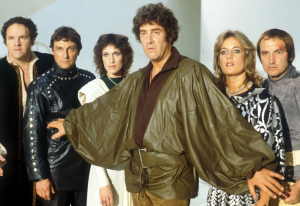
By now, you’re well aware of the massive shift to streaming video or impending streaming wars, as some are calling it. From what started as a small community with just a handful of OTT services like Netflix and Hulu has grown into an elaborate world with every major Hollywood studio wanting a chunk of the market. In a matter of hours, The Walt Disney Company will launch its highly-anticipated Disney+, a platform it has focused on for the better part of two years. Then in six months, NBCUniversal will launch Peacock — the eventual home of major binge-worthy shows like The Office and Parks and Rec — while WarnerMedia will follow it all up with HBO Max in May.
Videos by ComicBook.com
It’s no secret these major media powerhouses are dropping major wads of cash into these platforms to host massive libraries of studio-owned content. But what’s this paradigm shift mean for the independent studios not owned by the likes of Disney, Netflix, or WarnerMedia? We recently spoke with Thunderbird Entertainment president Jennifer Twiner McCarron about the changing landscape and as one might imagine, she’s as busy as ever. Thanks to the explosion of streaming video, Thunderbird now has a wide variety of partners to help develop content for.
The Vancouver-based studio is made up of three major offshoots: Great Pacific Television, a production house focusing on unscripted television; Thunderbird Productions, a studio focusing on scripted hits like the breakout Kim’s Convenience; and Atomic Cartoons, an animated outfit that has a handful of all-ages cartoons in the works with a slew of broadcast partners. With such a wide range of potential content offerings, McCarron tells us she’s excited for the onslaught of new opportunities.
“In today’s day in age where people crush content quickly, you constantly need new, exciting content to keep subscribers,” McCarron tells us. “That’ll be like going from a garden hose to a fire hose, so to speak, in how quickly you can download the content, so it’s exciting.”
The content output has been a blessing for Thunderbird, which currently has properties like Kim’s Convenience (CBC), The Last Kids on Earth (Netflix), and 101 Dalmation Street (Disney+) under its belt. The sudden increase in work has seen Thunderbird’s Vancouver office quickly expand to a workforce of over 500 employees, not including their off-site offices such as a year-old studio in Ottawa, another location home to an additional 150 employees. Will hundreds of animators, artists, and creators now at its disposal, McCarron says the studio is focused on pumping out a good amount of studio-owned intellectual property.
“It also gives us more ability to sell our own IP to develop because we have more buyers now,” the executive says. “With kids and family, it’s a great piece of every streamer’s platform because it’s the stickiest, so to speak, in that if your kids love Beat Bugs on Netflix, you’re much less likely to subscribe and unsubscribe. So, a key strategy for all of the streamers is to have a healthy kids and family viewing component.”
The studio currently has nine pieces of IP in production and an additional 25 in various stages of development. Take The Last Kids on Earth as an example. What started out as a young adult novel series by Max Brallier has now turned into an animated series on Netflix. Because of the success the show has experienced since debuting on the streaming giant in September, Thunderbird has reached toys and video game deals with the likes of Jakks Pacific and Outright Camp. “It’s exciting when you can lift an IP and get viewing like you can through Netflix and reach such a worldwide reach instantly, not just North America,” McCarron reminds us. “Then build all of the amazing ancillary businesses on top of that. It’s that much easier to put together a franchise like that.”
In a world dominated by the Marvel Cinematic Universe, a 25-film Bond franchise, an Arrowverse and more, McCarron insists Thunderbird will continue looking for more organic growth instead of trying to go after massive IP juggernauts like Transformers, Barbie, or LEGO. With a race to push as the most content with the biggest intellectual property available, McCarron insists she and her team continue having internal conversations reminding themselves they need to win the war on content by releasing one high-quality show or film after another.
She adds, “What will stand out is quality, not quantity. So we’re focusing on really building long term brands that are fresh and exciting and executing on them at the highest possible level of quality, focusing on the talent and the culture of the company and not trying to get a bunch of stuff out the door that is subpar because that won’t ultimately work.”
As for that little Kim’s Convenience show we’ve mentioned? It’s one of the first major roles Simu Liu added to his resume. As you might expect, the actor’s newfound fame as one of the newest stars Marvel Cinematic Universe has had a massive impact on the popularity of the show. “It’s one of those ones that’s beginning to increasingly catch fire as something special that’s happening. When I talked to the PR people and they go on some of the roadshows with the talent, it used to be 50 people coming in a room to hear a panel. Now, they actually are getting recognized while walking through the streets of Los Angeles.”
Despite his role as the Master of Kung Fu in Shang-Chi and the Legend of the Ten Rings, McCarron tells us he’ll still be on the show. “He’s staying committed to Kim’s Convenience, so we’re thrilled about that and we have several more seasons to come,” she says.
What streaming services do you currently subscribe to? By next summer, which offerings do you suspect will make it into your streaming repertoire? Let us know your thoughts in the comments below or by tweeting me at @AdamBarnhardt to chat all things streaming video!








